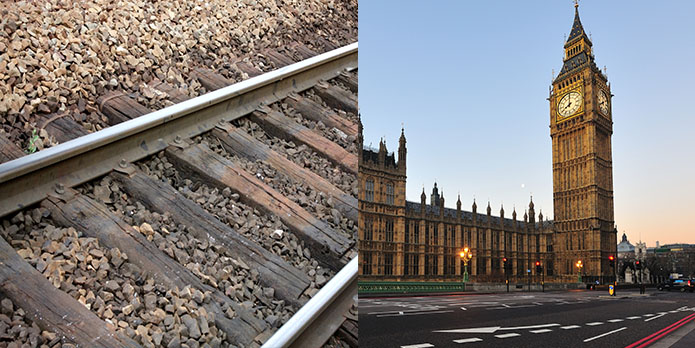
Ministers take control of Network Rail
Network Rail is now a public sector arm’s length body of the Department for Transport (DfT). Freshwater’ assesses the political implications following the reclassification.
At a recent Waterfront Conference Company event – UK Rail Industry Forum – Network Rail’s head of long term planning and funding, Calvin Lloyd, gave an update on the infrastructure manager’s investment plans for Control Period 5 (CP5). But listening to the presentation, I wondered how the recent changes, which have put Network Rail under closer ministerial control would affect the financial viability of projects planned for CP5.
Following a statistical decision taken by the Office for National Statistics in light of new EU accounting rules, the DfT has at last been forced to admit that it owns Network Rail. For the taxpayer, the most immediate and significant result of the reclassification is that Network Rail’s debt (circa £34 billion) now sits on the UK balance sheet.
But to what extent will this affect the day-to-day running of the UK’s infrastructure manager? DfT and Network Rail both say not at all, though Mark Carne, chief executive of Network Rail, did admit the move would bring ‘greater accountability and transparency to parliament, the taxpayer and fare payer’. The change is bound to lead to increased political control over an organisation, which from its inception has operated at very much further than arm’s length from Whitehall and Parliament.
One of the most high profile aspects of Network Rail’s business has always been executive remuneration. Previous Transport Secretaries have often been frustrated by their inability to take decisive action on the issue (due to the Treasury being wary of political interference lest the organisation be re-classified as a public sector body). In 2012 for example, Justine Greening MP voted against bonuses for the executive directors but this was merely advisory and had little effect. Now under the control of the government, Network Rail has already been told that it needs explicit permission for salaries over £222,000. The Secretary of State will also have the power to appoint the chair and approve the board’s suggested candidate for chief executive – the former having the potential to politicise Network Rail in a way not seen before.
Running Network Rail – a motivation beyond pay
Former Transport Minister, Tom Harris MP, summed up the views of many of his colleagues in Westminster when he recently tweeted: ‘Now that Network Rail debt is officially govt debt, no excuse for ministerial ‘hands off’ approach. 1st casualty should be directors’ bonuses’. Chairman, Richard Parry-Jones, has already highlighted the less financially-rewarding regime that will undoubtedly now be put in place for his executive directors, remarking that the ‘unique challenge’ of deciding how to effectively run Britain’s rail infrastructure would be motivation in itself.
Though bonuses are more politically significant, of greater interest to the wider rail industry should be the increased role for the Treasury in Network Rail’s financing and strategic planning. The organisation will now be able to borrow through the Treasury, rather than the City, which should be marginally cheaper and offer increased transparency. This should be good news for former Shadow Secretary of State for the Environment, Transport and the Regions, John Redwood MP, who has made much of Network Rail’s relationship with the Square Mile.
But it has been a long-held view at Horse Guards Road that Network Rail could achieve much greater efficiencies and this is likely to manifest itself in greater Whitehall control over projects and spending. It is, therefore, likely that Network Rail will be required to submit large project proposals to George Osborne’s team for sign-off. And with Ministers now directly accountable to Parliament for Network Rail performance and spending, there will be far greater scrutiny of budgets – a fact which won’t go unnoticed by those overseeing the costs of the current electrification programme.
Options for further oversight
The efficiency theme will not just be pushed by Treasury but by the DfT as well. The recently released Memorandum of Understanding governing the ‘new’ relationship between Network Rail and its political masters is large on value for money. It also notes that the Secretary of State for Transport will hold regular meetings with the chairman to ‘discuss corporate strategy, and raise any strategic concerns.’ Mandarins at Great Minster House are flexing their muscles and have already formed the ‘Network Rail Sponsorship Group’ to explore options for further oversight.
Reading through that document it is clear that both the Treasury and DfT will be looking for greater involvement in Network Rail’s finances, operations and strategy, but for the time being there remains a sense of waiting and seeing how the reclassification beds in.
Shadow Secretary of State, Mary Creagh, has welcomed the changes in regards to executive remuneration but has made much of the decision to continue to exclude Network Rail from being covered by the Freedom of Information Act (FOI), commenting that: “David Cameron said sunshine is the best disinfectant, but he and his ministers are strangely reluctant to let light in on the workings of Network Rail.” Creagh stated that Labour would make Network Rail subject to FOI, which should please campaigners such as Rail Freight Group chairman, Lord Berkeley, Simon Wright MP and Tom Brake MP who have often raised the issue in Parliament.
So, whether we call it renationalisation by the back door, or something else entirely, Network Rail is now fully under the control of Westminster and Whitehall. As the weeks and months pass, we shall see the full extent of Ministerial influence over the organisation, and what effect it has on the wider industry.
